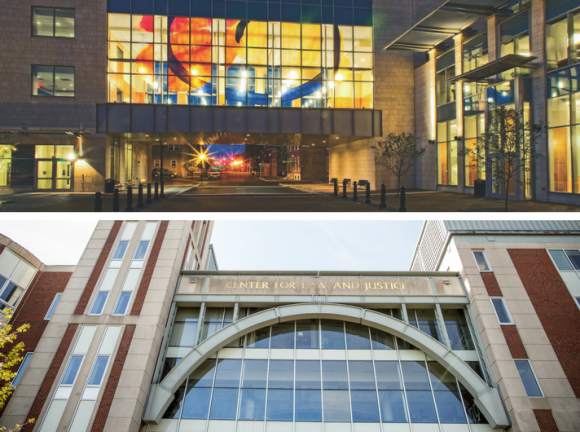
Rutgers Law School Camden building, Newark building
Rutgers Law School is ranked 11th in the National Jurist magazine’s 2017 Top 25 Best Value Law Schools rankings. Rutgers Law is the only school in the northeast that is included in the top 25 on that list.
The National Jurist rating system focuses on law schools that provide the best value for students.
The Best Value ranking system takes into account a law school’s tuition, the employment rate of students after graduation, students’ average indebtedness upon graduation, bar passage rates, and students’ cost of living expenses.
Rutgers Law’s employment rate for full-time positions, at 83.9 percent, is among the highest of the top 25 schools on the list.
For full-time in-state students, tuition is $24,512. It’s $37,156 for full-time out-of-state students.
The report shows that schools that charged higher tuitions forced some law school graduates into debt that could be as high as $180,000. Rutgers Law grads’ debt averaged $56,173.
The National Jurist rating is the second positive ranking Rutgers Law School has received this year.
In March, Rutgers Law School was ranked 62nd in U.S. News & World Report’s 2018 Best Graduate Schools rankings. This 30-position improvement is by far the largest of any law school this year and among the largest ever.
The U.S. News ranking is only the second time Rutgers Law has been ranked as a single merged entity of the Camden and Newark locations.
Moreover, in the U.S. News & World Report law school specialty rankings, the Rutgers Law clinical program rose from 26 last year to 19 this year, moving just ahead of Harvard (20) and Columbia (21). In addition, Rutgers Law’s legal writing program is ranked 23rd in the nation.
The rankings reflect the outstanding law school experience offered by Rutgers Law School which includes:
Affordability. In-state tuition at Rutgers Law is half (or less) of that charged by many private schools in the region, which means everyone who attends gets a strong educational value and, for the many students who receive need-based or merit-based scholarship aid, that aid is not being subsidized by the debt of classmates who are paying $50,000 per year or more.
A Diverse and Inclusive Community. For example, the Rutgers Minority Student Program (a longstanding and essential feature of the Rutgers–Newark location, and recently expanded to the Rutgers–Camden campus) provides opportunities for students of color — as well as anyone, regardless of race or ethnicity, who has faced socioeconomic or educational disadvantage — to succeed in law school.
Community Engagement. Rutgers Law School remains deeply engaged with the communities surrounding its two urban locations. In both Newark and Camden, Rutgers Law’s 21 clinics provide much-needed legal services for juveniles, immigrants, low-income residents, and others while giving students critical hands-on experience and skills. Rutgers Law Associates, a one-year residency program for recent graduates, provides between 10,000 and 12,000 hours of legal assistance each year, with around 10 percent of those hours provided pro bono for indigent clients.
Career Placement. As the rankings themselves reflect, recent Rutgers Law graduates from both locations have found meaningful legal employment at impressive rates, in private practice, judicial clerkships, and in serving the public interest.